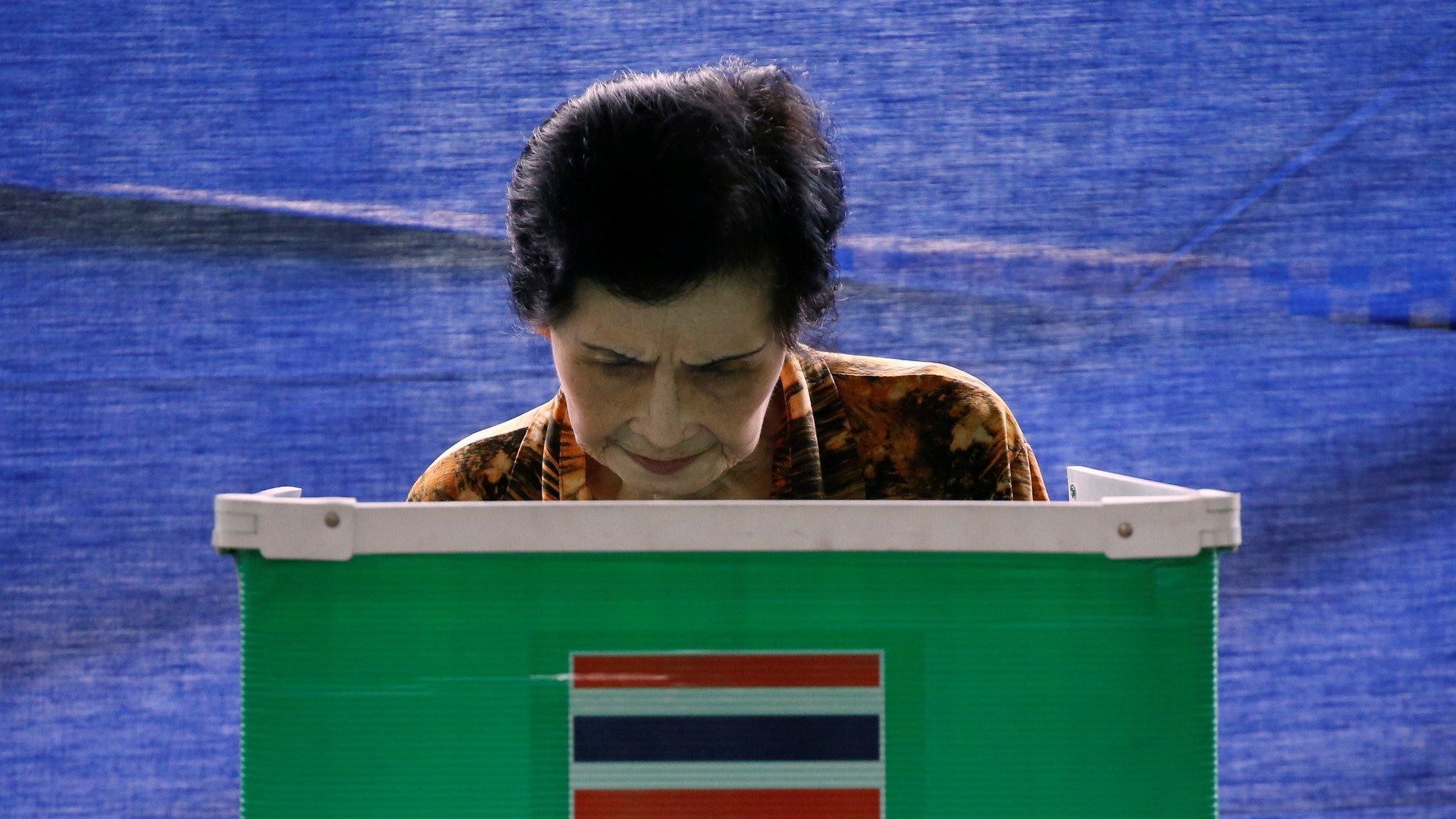Thailand's constitution: New era, new uncertainties
- Published
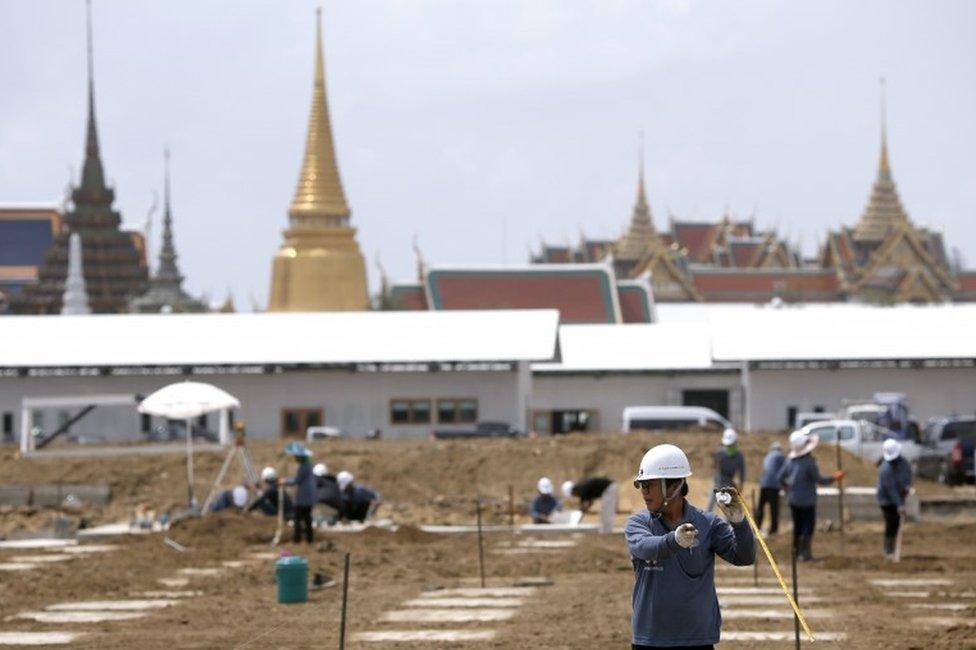
The new constitution comes at a tense time for Thailand after the death of the much-loved king Bhumibol
When a country has gone through 19 constitutions in less than a century, the official launch of its 20th risks being a non-event. The nonchalance with which Thailand has brushed off repeated coups and constitutional rewrites makes it hard for outsiders to take the arrival of yet another charter seriously.
But the military government, which has ruled Thailand since the 2014 coup, is taking this constitution very seriously indeed.
Right after seizing power, the generals announced their intention to restructure the country, in such a way, they said, that they would never have to mount another coup. We failed to fix things permanently after our last (2006) coup, they told us at the time - this time we have to get it right.
Their first attempt in 2015 failed, after the junta itself withdrew its own draft charter, fearful that it might not win sufficient support in the referendum they had promised the public.
Last August they tried again. This time they made sure their amended draft would pass, by imposing a strict ban on any campaigning, so the public understood very little about it, and by warning that the only alternative was extended military rule.
But even after the referendum, the constitution has been altered again at the request of the new king, Maha Vajiralongkorn, who succeeded to the throne after the death of his father King Bhumibol last October.
This overt intervention by the monarch was unexpected. The changes restore royal influence over important procedures, for example over the appointment of a regent, if the king is overseas or incapacitated, and at times of acute political crisis.
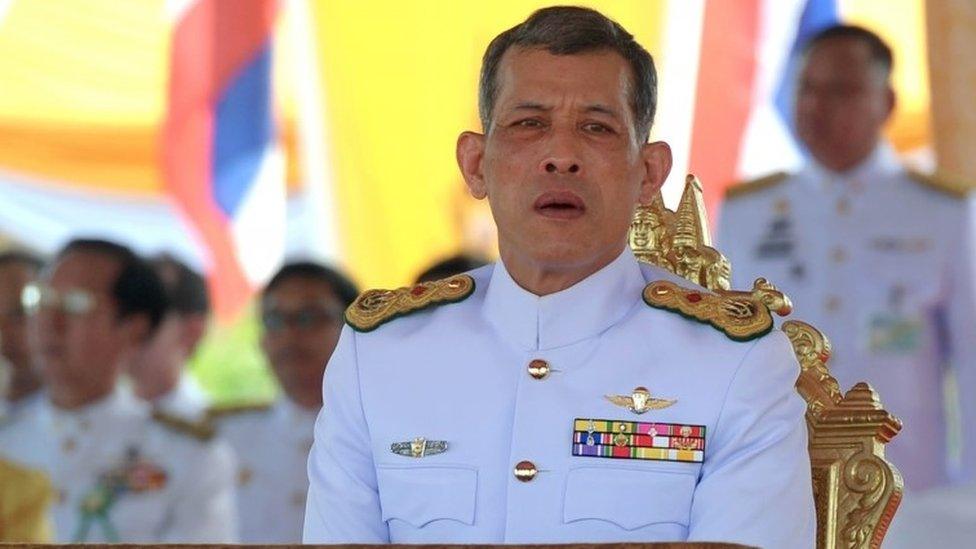
The new king is a very different personality to his father
The King presided over an elaborate signing ceremony at the Ananta Samakhom Throne Hall in Bangkok, where the first steps in ending the absolute monarchy took place in 1932.
It was held on Chakri Day, which commemorates the current royal dynasty, and the palace requested a 21-gun salute and for prayers to be chanted by Buddhist monks in temples around the country.
By contrast the last constitution in 2007 was quietly signed by his father just days after the referendum. By doing this King Vajiralongkorn appears to want to link this charter, in the minds of the Thai public, with the start of his reign, making it a central part of the historic political transition brought on by the death of King Bhumibol.
Weaker governments
So what was it that the military wanted to fix in this constitution? The two issues of concern most commonly cited by the government and its supporters are political conflict and corruption. But after examining the substance of the 279-clause document, its main target appears to be politicians, and their parties.
"We saw the past constitutions where the Thai people were very happy with their rights and freedoms fully protected", explained Norachit Sinhaseni, spokesman for the Constitutional Drafting Committee.
"Those constitutions did not last because of the way the politicians and political parties interacted with each other. What this constitution attempts to do is to find safety valves."
The new charter introduces a different electoral system, a modified proportional method of choosing the 500 members of the lower house of parliament in which people vote for one of 350 constituency candidates; those votes are totalled to determine which of the remaining 150 party list seats go to which party. Under the previous system voters cast two ballots, one for the candidate and one for the party.
This is likely to increase the seats held by medium-sized parties, but significantly reduce the seats held by the party of former Prime Minister Thaksin Shinawatra, which won every election held since 2001.
Weakening Mr Thaksin and his allies was an undeclared, but barely disguised, objective of the coup-makers. Under the new system Thailand is more likely to have fractious coalition governments, as it did back in the 1990s.
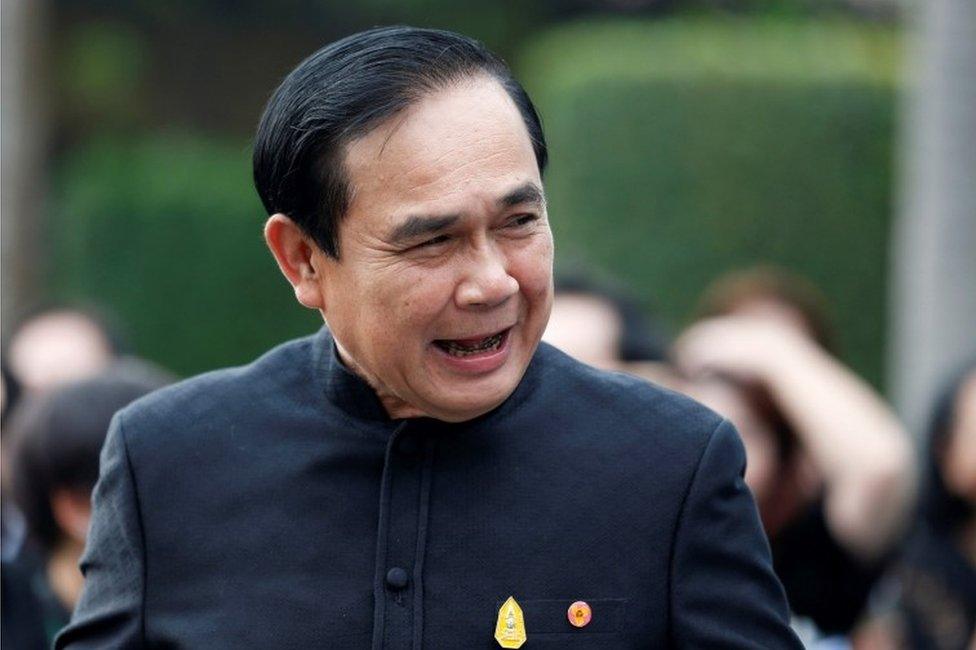
Along with weaker governments, the constitution stipulates that an unelected, 250-seat upper house, or senate, will wield significant influence in the years following the election, currently expected at the end of 2018.
Membership of the senate will be essentially determined by the military, giving the generals enormous sway over future governments, which would need three quarters of the seats in the lower house to have a majority in both houses.
Elected governments will also be bound in this constitution to follow the military's 20-year blueprint for Thailand, and it will be easier for the "independent" bodies, like the Constitutional Court, which will have enhanced powers, to constrain those governments even further.
It is not hard to see this charter as a straitjacket around any elected administration. Even the man who oversaw its drafting, Meechai Ruchupan, described it as "strong medicine" which would not be popular with political parties.
Academic Prinya Thaewanarumitkul from Thammasat University argues that it will create a "hybrid" political system, only partially democratic. He believes it will fail to address the deep political rifts in Thai society.
"Our checks and balances have not worked well," he says, "so the drafters of the constitution have tried to write down what everyone should do and not do, in a document running to 42,000 words.
"But few people can read such a long constitution, so they do not understand the new rules, they cannot control the way the game is played. They will feel left out."
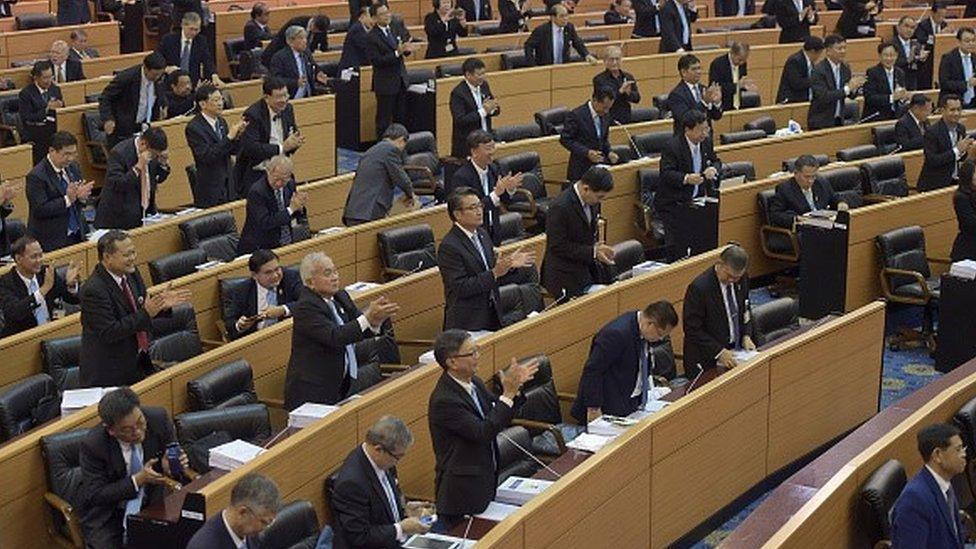
No one is able to say how many changes have been made to the constitution
Tyrell Haberkorn, a fellow of the Department of Political & Social Change at the Australian National University who has written extensively on Thailand, is more critical.
"Despite claims by the junta otherwise," she writes, "the new constitution creates a permanent place for the military in government and seeks to normalise their intervention.
"From start to finish - the drafting by a select group, the strict control of discussion of the draft, and the last minute amendments - the new constitution risks institutionalising authoritarianism rather than paving the way for democracy."
These concerns have been repeated by other academics, Thai politicians and legal experts. But they will carry little weight with a military government which has, time and again, said it prioritises maintaining stability through a difficult transition over democratic principles.
Thais are left with one certainty, and two uncertainties, as this constitution comes into effect. The certainty is that the armed forces will try to retain the whip-hand over future governments for at least another decade.
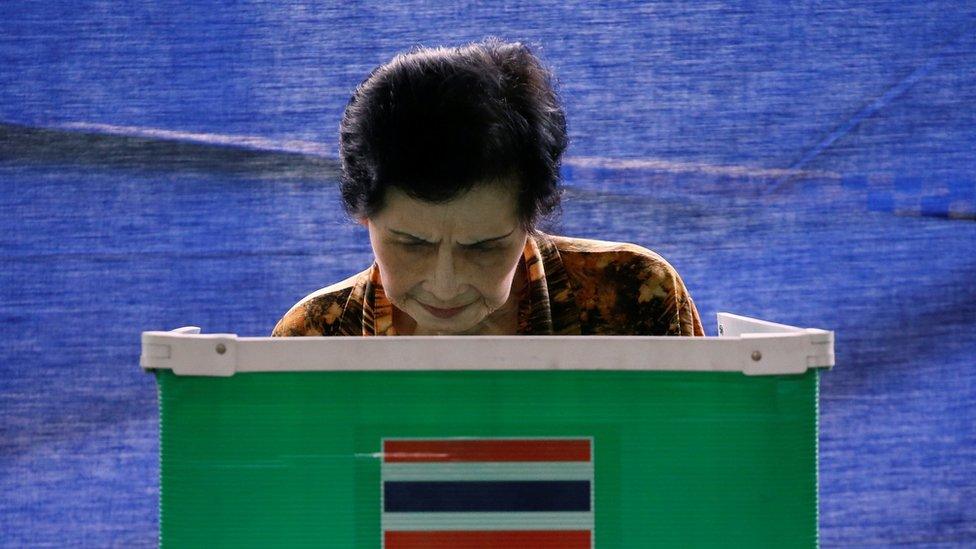
Thais voted in a constitutional referendum in August last year, but there was a ban on campaigning
The two uncertainties are over, firstly, how the new king will play his part. He is a very different personality from his father, and has already raised eyebrows by requesting changes to the constitution. The dynamic between him, the armed forces and future governments could profoundly reshape Thai politics.
Second, no one knows how strong the residual support is for Thaksin Shinawatra and his allies. In two previous elections, in late 2007 and in 2011, pro-Thaksin parties did better than expected.
Even with the tighter constraints imposed by the new charter, once political activity is permitted again, it is possible that parties could rebuild sufficient popular support to challenge those constraints.
- Published3 May 2019
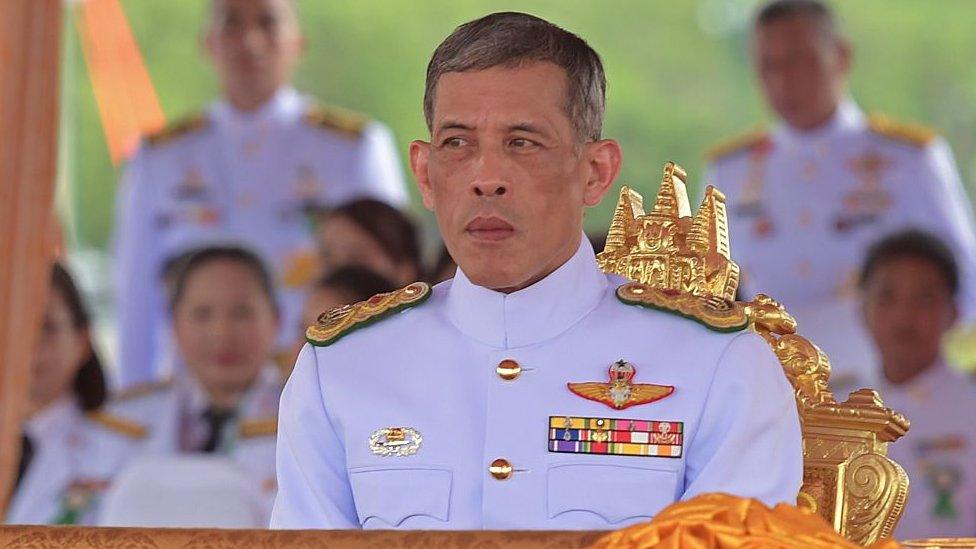
- Published9 August 2016
